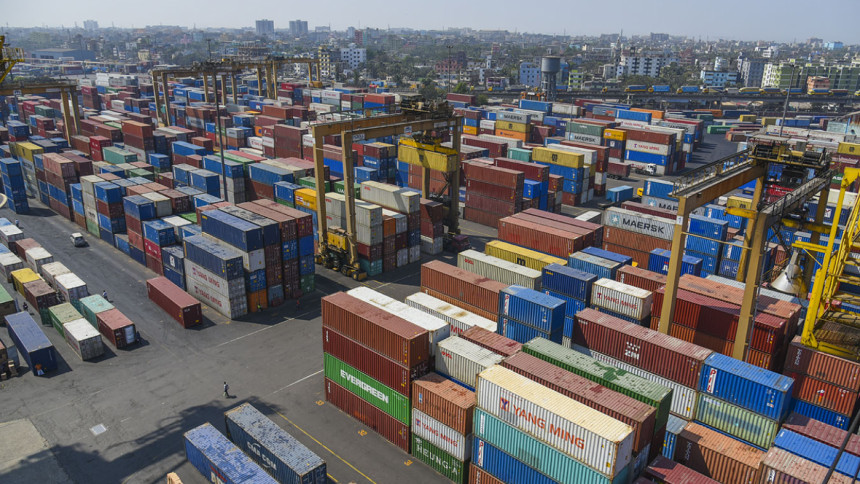Bangladesh Bank (BB) recently released revised export figures for July-May 2024 that are much lower than the figures reported by the Export Promotion Bureau (EPB). According to BB, actual export earnings for the period was $40.7 billion, compared to $51.5 billion reported by EPB. This nearly $11 billion discrepancy has raised considerable speculation about the true export performance and reliability of macroeconomic data in Bangladesh. It has also led to speculations about the implications of this adjustment for the macroeconomy.
The reliability of the export data, published by EPB, has been under scrutiny from BB for well over a year. Since FY2022, actual export earnings emerging from the banking sector data were significantly lower than the figures reported by the EPB based on the customs data of the National Board of Revenue (NBR). The initial reasoning was a combination of the gap between export shipment and actual earnings, and the suspicion that exporters were not sending back all earnings and were instead holding them outside Bangladesh (capital flight). Accordingly, in their published data, BB continued to use EPB figures for exports but adjusted the difference below the line in the financial account under the heading of negative trade credit.
The gap between EPB figures and earnings reported by commercial banks got cumulatively larger, which ballooned the negative entry of trade credit in the financial accounts.
Prodded by the IMF, the BB established an investigative team led by the bank staff, with participation by staff from NBR and the EPB. Detailed investigations showed that the NBR reported exports figures to EPB were overstated owing to several accounting errors all pertaining to RMG exports. These included: (i) serial duplication errors in customs data; (ii) miscalculation of value of fabrics; (iii) sample items classified as products with export value; (iv) sales by EPZ-based firms being counted twice; (v) failure to adjust the gap between initial LC value and actual export proceeds; and (vi) loses from stock-lot sales, discounts, and commission not being adjusted.
The inevitable conclusion is that export figures reported by EPB based on NBR customs data for RMG were much higher than actual RMG exports as reported in the export earnings figures emerging from the banking sector reports. The estimated gap for the FY2022-FY2024 is shown in Table 1. For FY2024, the full fiscal year estimates are based on July-May data. The revisions are still preliminary and a team comprising of EPB, NBR and BB staff has been constituted by the finance minister to undertake a detailed review of all export numbers. The findings are expected to be available in the next 3-4 months.
What are the implications of this revision?
First, while the substantial downward revision in the export figures is disappointing, it paints a much more realistic picture about the challenging global environment for exports faced by Bangladesh. Exporters in general have been complaining about rising costs and falling demand for RMG. Moving forward, the recent correction of the exchange rate policy should help. Reduction of inflation would also be helpful. But a much more aggressive export diversification strategy is needed. The supportive policies include reform of trade policy to eliminate the anti-export bias, sharp improvements in trade logistics, attraction of FDI in export-oriented enterprises, and upgrading of labour skills through in-house and government-financed training programmes.
Second, the immediate effects of this adjustment for the macroeconomy are thankfully negligible. The effect on the balance of payments (BOP) is zero because the BB numbers are already built into the actual BOP numbers. In a way, the correction of the financial accounts provides some relief that the perceived huge negative outlook of trade creditors about Bangladesh reflected in the large negative trade credit balance is not true. It is also a relief that the perceived huge capital outflows from the export account is not based on facts. There may still be some element of that, but if so, it would likely be small. The correction of the overvaluation of exports could have implications for GDP estimates. But the government has clarified that the Bangladesh Bureau of Statistics (BBS) uses actual export earnings data provided by BB for calculating GDP, which is then double-checked with production data.
Third, and most importantly, the revision serves as a wake-up call for the government to really upgrade its capacity to gather correct information and share it on a timely basis with the people at large. Credit goes to BB for having the courage to report the errors in the public domain. BB also has a strong team of economists and statisticians and therefore is able to provide good data on a timely basis on its website. But this is not true of many other government entities. For the immediate future, the EPB and the NBR must make all-out efforts to upgrade their data collection, investigation and analytical capabilities with some minimum staffing of professional economists and statisticians. The NBR collects a lot of data on revenues but has very little investigative or data analytical capabilities. As a result, it is impossible to determine the quality of the data.
At the national level, the primary data agency, BBS, has been slowly upgrading its capabilities but there is still a long way to go. Concerns about the reliability of national accounts and inflation figures have been raised by many researchers. Since the BBS provides public goods (knowledge and information), it should be an autonomous body funded by the government, but managed by professionals rather than civil servants.
Overall, a strengthening of BBS with professional staff and some minimum investment in upgrading data mobilisation and analytical capabilities of core government institutions dealing with the macroeconomy, and sharing them widely online will go a long way in calming the prevailing skepticism about the true state of the macroeconomy.
Dr Sadiq Ahmed is vice-chairman of the Policy Research Institute of Bangladesh (PRI). He can be reached at sadiqahmed1952@gmail.com.







